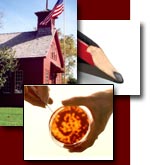| Site Map | Contacts | Links | Newsletter | |
Homeschool:
Spelling
Don't confuse the apostrophe ('s)
-
Don't confuse its with it's. Its means belongs to. It's means it is.
-
Don't confuse your with you're. Your means belongs to. You're means you are.
-
Don't confuse whose with who's. Whose means belongs to. Who's means who is.
-
Don't confuse there with their and they're. There means where. Their means belongs to. They're means there are.
-
Don't confuse the singular and plural possessives. Use 's for singular and use s' for plural.
Don't confuse to, two, and too.
Two is the number 2. To is a preposition meaning toward, or it is an infinitive when in front a verb. Too is an adverb meaning also or shows excess.
Don't confuse ie and ei
Remember i before e except after c or when sounding like a as in neighbor and weigh.
Don't confuse plurals
Usually add s to make nouns plurals. Add es to nouns ending in s, x, sh, and ch. (Exception: ox/oxen, and child/children).
Words that end in f or fe change to v an add es to make them plurals. (Knife/Knives).
When words ends in y change the y to i and add es to make them plurals. (baby/babies).
Don't confuse the following
Don't confuse then with than. Then means when. Than is used to compare two things.
Never say must of, could of, would of, or should of! Always use the helping verb have. Example: I should have went to the store. Of is a preposition at the beginning of a prepositional phrase. It must not be used as a helping verb.
Don't confuse the following pairs that sound similar
capital = a city or capitol = a building
accept = receive or except = leave out
loose = not tight or lose = misplace, not win
medal = an award or metal = a mineral
desert = a dry region or dessert = treat after a meal
already = previously or all ready =all are ready
past = over, already happened or passed = moved ahead of
stationary = in a fixed position or stationery = writing paper
